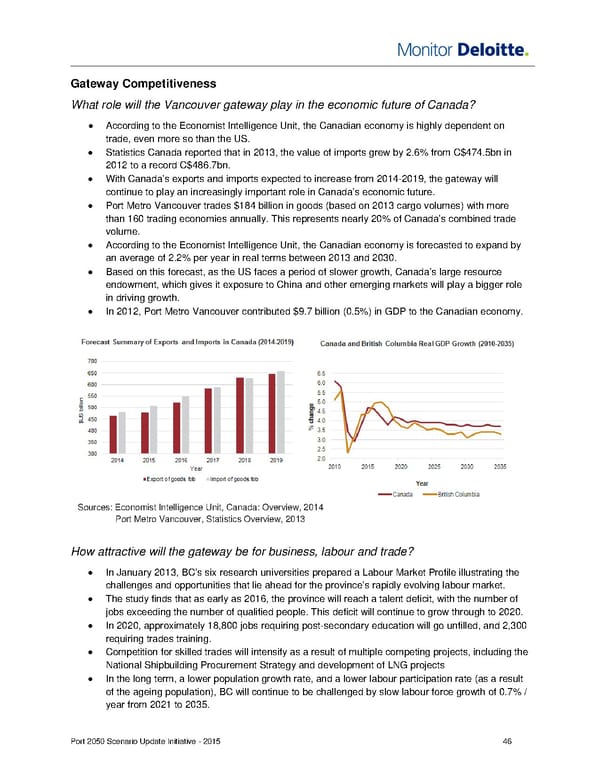Gateway Competitiveness What role will the Vancouver gateway play in the economic future of Canada? • According to the Economist Intelligence Unit, the Canadian economy is highly dependent on trade, even more so than the US. • Statistics Canada reported that in 2013, the value of imports grew by 2.6% from C$474.5bn in 2012 to a record C$486.7bn. • With Canada’s exports and imports expected to increase from 2014-2019, the gateway will continue to play an increasingly important role in Canada’s economic future. • Port Metro Vancouver trades $184 billion in goods (based on 2013 cargo volumes) with more than 160 trading economies annually. This represents nearly 20% of Canada’s combined trade volume. • According to the Economist Intelligence Unit, the Canadian economy is forecasted to expand by an average of 2.2% per year in real terms between 2013 and 2030. • Based on this forecast, as the US faces a period of slower growth, Canada’s large resource endowment, which gives it exposure to China and other emerging markets will play a bigger role in driving growth. • In 2012, Port Metro Vancouver contributed $9.7 billion (0.5%) in GDP to the Canadian economy. Sources: Economist Intelligence Unit, Canada: Overview, 2014 Port Metro Vancouver, Statistics Overview, 2013 How attractive will the gateway be for business, labour and trade? • In January 2013, BC’s six research universities prepared a Labour Market Profile illustrating the challenges and opportunities that lie ahead for the province’s rapidly evolving labour market. • The study finds that as early as 2016, the province will reach a talent deficit, with the number of jobs exceeding the number of qualified people. This deficit will continue to grow through to 2020. • In 2020, approximately 18,800 jobs requiring post-secondary education will go unfilled, and 2,300 requiring trades training. • Competition for skilled trades will intensify as a result of multiple competing projects, including the National Shipbuilding Procurement Strategy and development of LNG projects • In the long term, a lower population growth rate, and a lower labour participation rate (as a result of the ageing population), BC will continue to be challenged by slow labour force growth of 0.7% / year from 2021 to 2035. Port 2050 Scenario Update Initiative - 2015 46
 Monitor Deloitte - Final Report Page 47 Page 49
Monitor Deloitte - Final Report Page 47 Page 49